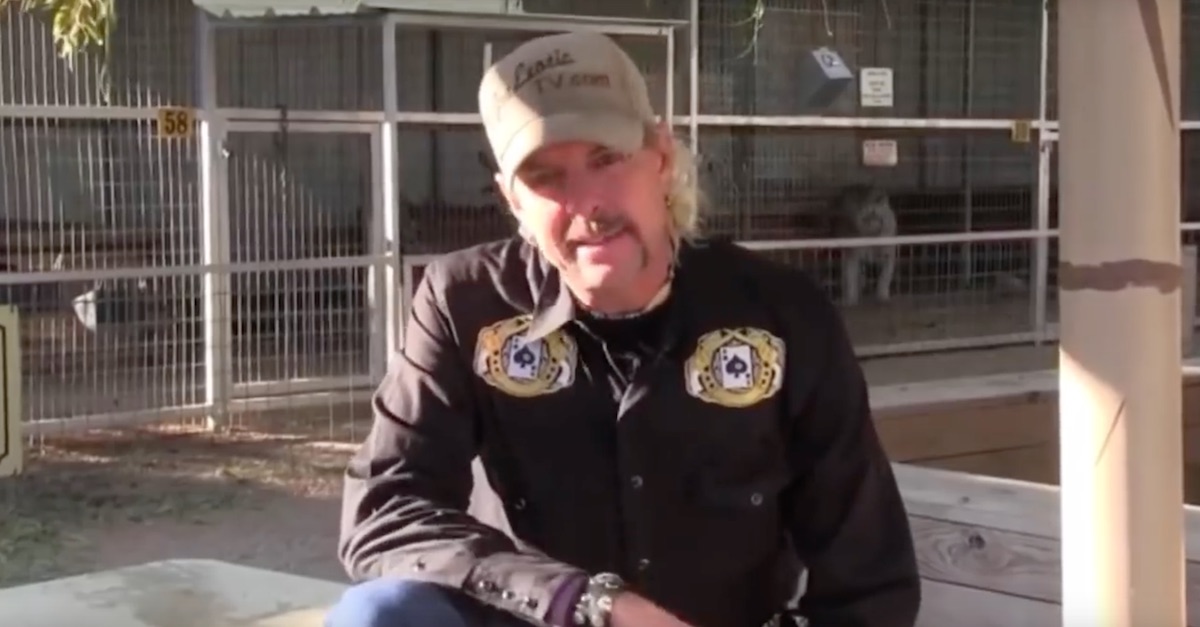
A federal judge in Oklahoma has advised that Joe Exotic‘s massive 15-count lawsuit seeking $88.8 million in redress and damages be dismissed in full for suffering from various procedural deficiencies.
On Tuesday, U.S. Magistrate Judge for the Western District of Oklahoma Suzanne Mitchell issued a relatively terse 10-page rebuke of Exotic’s claims that federal agents and his former business partners concocted an entrapment scheme against him–for which he is currently serving the beginning of a 22-year federal sentence.
Per Exotic, the scheme occurred by way of–and resulted in:
(1) misleading a grand jury; (2) perjury; (3) conspiracy to commit perjury; (4) false arrest; (5) false imprisonment; (6) malicious prosecution; (7) loss of personal property; (8) pain and suffering; (9) mental anguish; (10) the death of [his mother] Shirley Schreibvogel; (11) discrimination; (12) selective enforcement; (13) misrepresentation of the Endangered Species Act; and (14) violating federal defendants oath of office.
Mitchell notes that Exotic documents his allegations “with an extensive narrative” that alleges he was made to “pay the price for asking for a trial” by federal law enforcement authorities after refusing to take a plea bargain over charges in an alleged murder-for-hire plot allegedly targeting his arch-nemesis Carole Baskin.
The core of the judge’s advisory opinion has to do with Exotic filing his claim using the wrong legal theory and cause of action.
Exotic’s lawsuit was styled as a Bivens claim, which is the sole legal remedy for suing a federal agent who deprives someone of their constitutional rights. The right is not enshrined in statute, however, it stems from Supreme Court precedent and is extremely limited.
Such a claim, Mitchell notes, “serve as the proper vehicle to attack unconstitutional conditions of federal confinement and prison procedures.” But the claims in Exotic’s lawsuit have to do with his conviction and the circumstances leading up to his arrest–rather than objectively unlawful behavior committed by a federal agent.
“When a plaintiff challenges the legality of a confinement, a party must file the case as a habeas corpus proceeding rather than under Bivens.” Mitchell explains. “Because Plaintiff is a federal prisoner, he must raise such challenges to his confinement in a motion to vacate, set aside, or correct sentence under 28 U.S.C. § 2255.”
The judge does recognize that these are legal niceties concerning minutiae not readily apparent to non-lawyers or judges–and Exotic is currently representing himself without an attorney.
So, Mitchell considers whether or not to be helpful and “recast” Exotic’s lawsuit under the proper pleading standard. But that’s foreclosed against as well for another and different procedural reason.
“[T]his Court should generally not [of its own accord] recharacterize a prisoner’s petition for post-conviction relief as a [habeas corpus] petition,” the opinion continues. “Because Plaintiff’s appeal is pending, the Court should not recharacterize his complaint as a petition.”
Essentially, Exotic is already appealing the basic fact of being federally incarcerated and the judge views the lawsuit as an improper attempt to conduct parallel litigation alleging much of the same claims as contained in the ongoing appeal of his federal sentence.
As a magistrate judge, Mitchell’s advice does not necessarily hold the day but subsequent events don’t augur too well for the one-time Tiger King.
Exotic quickly moved to have Mitchell recused from the matter by appealing to the district judge who will ultimately decided the lawsuit’s fate.
On Wednesday, that request was denied.
[image via screengrab/Netflix]